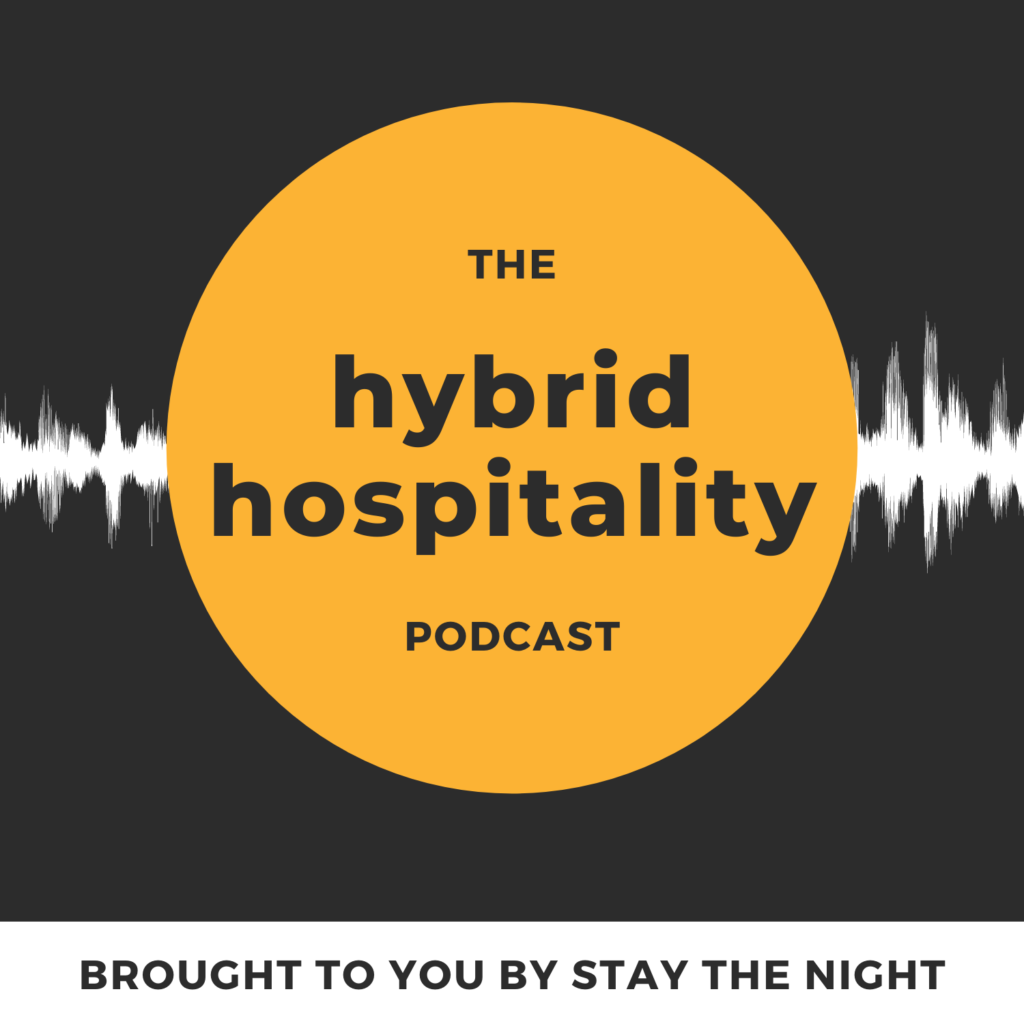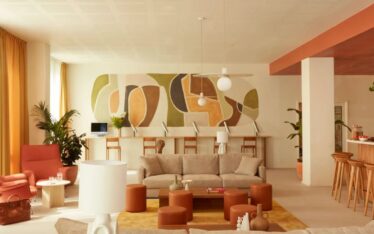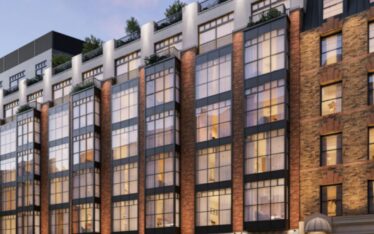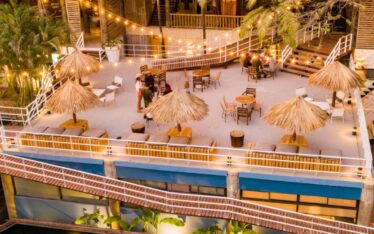The Hybrid Hospitality Podcast will examine the trends that are transforming hospitality and explore what the future of the industry might look like.
In this episode, Rosie chats to Andrew Landsburgh the founder and director of CODE, a hybrid hospitality brand that creates multi-purpose spaces for people to stay, work, eat, drink and socialise – all under one roof. Scroll down to read the transcript of this podcast episode…
Introduction: You are listening to The Hybrid Hospitality Podcast.
If you’re interested in the trends that are transforming hospitality and want to explore what the future of the industry might look like, then you’re in the right place. This podcast is brought to you by Stay the Night, a creative marketing agency, working with hospitality businesses around the world that are changing the way people stay, work and play.
In this episode, I’ll be speaking with Andrew Landsburgh, founding director of CODE. CODE is a hybrid hospitality brand that creates multi-purpose spaces for people to stay, work, eat, drink and socialise – all under one roof. As the first brand to introduce pod beds to the UK, CODE were ahead of the curve in offering social dorms with a private room feel and all on a budget. They currently operate two sites in Edinburgh – luxury hostel The CoURT, and the city’s first co-living space, The LoFt.
In this episode, we hear about the business benefit of pod beds, how CODE pivoted at a crucial time during the pandemic, and why empowering your team has a real impact on the guest experience.
Let’s start at the beginning – how did you come up with the original concept for CODE?
So it was a long time ago now, back in 2014. Edinburgh basically didn’t really have – in my opinion – a cool hostel and yet there were loads being built around the world and loads in Europe. I bought this building initially to do serviced apartments and I stayed in hostels as most people have who become hostel owners and developers and thought there’s an opportunity to do something cool. And then I just looked around, took some ideas, incubated some designs and yeah, the first CODE was born!
You were the first to bring the pod concept over to the UK, that’s obviously very popular in Asia. What was the inspiration behind that? Had you been travelling over there?
I had and that was a bit of inspiration. I think that the other thing that I liked about it was that I was wanting to create something that was quite clean and quite sophisticated, so a grown-up type hostel – one I would like to stay in if I was a young professional rather than just in my teenage years. I think there’s a real wider demographic of people that stay in hostels and that for me was one of the reasons that it was just so appealing. We also know we get a large amount of Asian visitors to Edinburgh and so it’s quite a good idea to try and create something that they’d recognise.
Yeah! When we came over for the CODE launch, we stayed in the pods and I always say to people that I want one at home because they’re so comfy. I was quite surprised myself because I’d never stayed in one before I stayed at CODE and I had such a good night’s sleep.
So what are the main benefits (of pods) for guests then?
I think it’s that privacy element; you just feel like you’ve got your own little room when you get into it. We provide eye masks and ear defenders and you feel like you’re in your own little cocoon. It feels nice and you close the curtain and you fall straight asleep. So from a guest perspective, the sleep quality is just that bit better and that privacy aspect as well. Especially now as 10 years ago people didn’t sit with iPads and iPhones and a light buzzing in the middle of a shared dorm, but you do now.
Yeah, you do feel like you’ve got that private space in a pod much more than a bunk bed. So, from a business perspective, what are some of the business benefits as well?
The biggest one is that you charge a slightly higher rate for the pod and therefore that gets you better quality guests. You’ve got good guests, paying higher rates, getting better reviews and it’s just an all-around positive experience. So, they obviously cost a lot more than traditional bunk beds, but the return is pretty quantifiable – it’s pretty strong.
We started working together just before The CoURT opened, your luxury hybrid hostel on the Royal Mile. I know when we first started speaking, you were really keen on the heritage of the building, as you were showing me things that you’d found that were a part of the history of it. So in what ways have you honoured its heritage with the concept?
I could talk for days about that! And so every way possible, I think we’ve tried to. If you just take a walk around the building you can see that we’ve kept all the original prison doors and we’ve got some of the prison walls with the graffiti still open for everyone to see what they were writing on the last hundred years. When the building was built, it was the same mechanical engineer who did the heating and ventilation that did The Balmoral and The Queen’s home. You just go back through the drawings and what they did and how they did it is phenomenal. So we’ve got lots of signs in stories up around the building about that. Underneath the building, this is where we’ve got the vaults. Tthe history is amazing and we’ve kept all the cool vaults underneath. We even do whisky and beer tastings down there (in the Lost Close). Everywhere you turn you’ll see a part of the history of the building.
It’s something that guests really respond to, especially a building like that with so much history. So you mentioned The Lost Close there briefly – for our listeners, can you tell us more about how that works?
When we were developing the building, we found underneath the site that there were some old locations where they kept all the mechanical electrical equipment. So we started researching the building and found that it was destroyed – the whole area of Parliament Square was destroyed in a big fire in 1824. Prior to that, it was a really fundamental location where people met. The more and more you read about it, the more amazing the history is. So in this space, we created an area to drink and an area to sit and socialise in. We’re still upgrading at every possible opportunity. It’s a great, fun place to hang out and for people to meet each other.
CODE is really popular with solo travellers – how do you facilitate that connection between guests when they’re travelling alone?
I think the key is creating events that anyone can turn up too. In the morning, the middle of the day, the evening – so that there’s always an opportunity for other people to meet each other. It has definitely been tougher over the past year as we’ve had to reduce what we do and initially we weren’t able to do anything. We are slowly bringing it back in terms of capacity. When we are treating things normally, we find it’s about creating events that people can meet each other on. Quite often, whether it’s after walking tour in the morning or whether it’s after an evening tasting, (guests) will go out together and become friends. You hear lots of really great stories!
I feel that your team are a big part of that as CODE’S reviews are often people raving about the staff. Why do you think it’s important for the team to be such a big part of the guest experience with a hostel?
When you stay in a hostel it’s the closest thing to being in somebody’s home. You know, the staff treat it as their home in terms of the way they welcome guests and the people they meet. One of the key things is that it feels really, really welcoming – that you’re meeting somebody who wants you to have a good experience and is really proud of where they work as well. It’s just very different. We don’t have a corporate training programme. We basically try and attract people who are happy, friendly, welcoming, and then we put them all together. You get a nice magic mix, and as you say, it shows in the guest reviews.
So from an operator perspective, what advice would you give in terms of operators who are looking to create that kind of family vibe with their staff?
It could potentially get harder, the bigger you get. But at our size it’s just creating a great team and giving them the autonomy to meet, to socialise and put events on for your team. We’re not dogmatic in our business. We encourage new ideas and we encourage new events. I guess the way we’ve positioned ourselves and the people that we’ve got in the business, we keep attracting the right people.
Let’s talk then about the LoFT. So this was your first hostel and during the course of the pandemic, you transformed that into a co-living space. Why did you opt for that model?
There are a number of reasons, but the first one was we could see that a certain set of guests were needing longer stay accommodation. People couldn’t travel anywhere, people were completely locked down and we had a number of guests who needed somewhere to stay across both of our buildings. It made far more sense to have them all located in our smaller building rather than rattling around in the bigger one. The next thing that became apparent was that we didn’t need separate staff because we didn’t have a high turnover anymore. They were initially on furlough and it became pretty clear that there wasn’t going to be a need for that long term. So we removed the receptions and created a bigger lounge area so the coliving guests could use it. We’ve got a much nicer, bigger space now and it’s worked well. We’ve got a good cohort of longer-term stays and a mixture of some shorter-term and a much better common area. It was just obvious that there was a demand for it and the team jumped on it pretty quickly and then refurbished the ground floor area to make sure that it worked.
Yeah, it was a really quick pivot, it was great. I suppose there’s a lot of parallels between hostels and coliving because it’s centred around community and bringing people together so it lends itself well if you already have that embedded in the brand.
Your focus at the LoFT is on a kind of shorter-term co-living – so more digital nomads, people who are on the move – rather than longer-term residents who are going to stay for years and years. What do you anticipate that the demand will be for those kinds of concepts in the months ahead, coming out of the pandemic as people are able to work from anywhere?
I think it will be big from my personal point of view. Having worked from my house for a large part of this – and know you can do plenty of video calls – but your energy starts to be zapped. You need to be on the move, you need to be in different locations just to feel good, I think it’s good for your brain to see different things. I think that there’ll be a huge demand for it because it’s gonna get people energised again, get people working from different locations. And I don’t think that everybody wants to be working from the same bedroom again for the next, you know, five years!
We use a coworking space and while that’s being closed it’s been tough. Just because they can work from home, I don’t think that means people are going to want to work from their actual homes. I also think young people especially will see it as an opportunity to travel, like “Oh I’m going to go and sample that city for three months and that city for three months.” It’s an exciting time.
In future projects for CODE then, are you looking towards mixed-use developments like this kind of hybrid trend?
Yeah, definitely. I think what we want to do is make sure that the building can cater to each sector quite well. I think that there are obviously low periods and high periods of demand from both digital nomads, short-stay travellers and long-stay travellers. You’ve got a huge wide mix of demand and it’s trying to create a building that can meet all that demand at different times of the year. Likewise, we have a really strong team and a head office that can make sure that we’re always reacting to it really well.
So why do you think hybrid concepts and mixed-use developments are attractive from an investment perspective?
There’s a number of reasons, but coming back to that point about reacting to the different times of the market peaks and troughs and demand. So if you do a 12-month stay, you’re generally fixed at one rate for that 12 months, not one customer. Whereas we have the capability to market, price and operate for every different type of customer and therefore our revenue per square foot dramatically increases because we’re able to diversify and move with the demand and the season. From an investor point of view, if you see if you’re signing up for long-term rents, then you’ve got no idea, especially with the way people are talking about inflation, whether you’ve priced that part of your property properly. Whereas you can be pretty sure that working in a kind of open model hybrid concept, you’re always getting market pricing weekly, daily, and monthly. So I think I think that’s important for investors and I think going forward it’ll be more and more common.
So The CoURT – and The LoFT to a degree as well – has an area where you can work from. Would you ever go down the membership coworking route in the future or do you think you’ll keep it open for a more casual approach?
I think we’ll keep it open and I think that there’s so many good competitive concepts out there. But as a business, we need to keep it front of mind what we’re good at and what we knew well. Certainly, that’s more rooms and pods and creating good events, experiences and things like that. We want to focus and keep doing what we do best.
There’s a lot of hotel brands that are now moving into this space of selling experiences, having activities on site. How much do you think the hybrid concept has been inspired by the hostel industry?
I think the hotels are looking for differentiators now that it’s a more competitive market out there. And I think experiences are clearly the way to go. There’s so much cross over between hotels and hostels now, but I think it’s just constantly trying to work out what the customer wants and how to cater to it. It’s never a bad thing when hotels do that because 1: it helps the profession, which is always good, and 2: the software moves to that as well. Once a hotel market fixes it, our SAS software improves and there’s better facilitators out there.
Just touching on technology a little bit, can you talk about how you use new technologies at CODE, and what you think about balancing tech with the guest experience? Cause I know that there’s been a big move towards contactless check-in, and checking in without seeing anybody, but what’s the payoff for that from a hospitality perspective?
There’s always going to be a good reason to have really good staff onsite coming back to the viewpoint of me down there welcoming people when they arrive. You know they’re always mentioning our staff when they’re giving us strong reviews. It’s about freeing up time for our staff to have that special touch and special conversation with the guests because the administration part is done by the software. Another key part of it is just making sure that all guests are aware of everything that is available. If it comes down to you, relying on the check-in staff to make sure that every guest is fully aware of everything that’s going on and everything that’s available in the hostel or in the surrounding area, that’s going to be pretty hard to implement. And you’re probably gonna get a pretty inconsistent picture for guests. Whereas if you can use software to deliver that, and then guests can pick and choose, what to join in and what to see while they’re staying.
So obviously the pandemic had such a negative effect on hospitality across the board, but I’d say that cities have been the hardest hit from a tourism point of view. What do you think the key is then to attract in people back for city breaks during this time?
It’s interesting. New York’s now buzzing again by all accounts. I think that the reason people go to hostels is to meet other people and the biggest diverse range of people you can meet is generally found in the cities. So yeah, I think that cities will come back and bounce back fairly quickly. And I think that young people, in particular, aren’t scared of going back and cities.
I suppose with Edinburgh, you have the advantage of having all the natural beauty right on the doorstep so if people are wanting to have more outdoor experiences, you’ve kind of got the best of both worlds in a city…
Yeah, I think so. I think it’s fundamentally what everybody’s been restricted in the last 12 to 18 months as to what suits them. But from a mental health point of view, I would see social interactions being really restricted and they’re really important for your own mental health. Being in wide-open green spaces if you’ve been able to, is great, but you know, solitude’s not everything.
Putting the pandemic behind us – if we can hopefully – what’s in store for CODE for the next 12 months?
I think we’re seeing more opportunities where we can take the CODE concept. We’ve looked at smaller sites, larger sites…larger sites generally work better for what we’ve just spoken about in terms of being able to cater to different variety of guests. There’s definitely going to be people that come to the end of this year – because this year hasn’t been any easier than the last – who definitely want to move on. I think there’s going to be opportunities that’ll come out of that, but we’re seeing new opportunities in the UK mainland here, some in the US too. The problem that we have right now is that we can’t travel to them. As soon as we can I think deals will get done and we’ll be starting to announce new sites.
I think it’s an exciting time in cities, especially because of what’s going to happen to all the office space as well…
Yeah, definitely, if we can get the planning right, there’s an opportunity to do lots of hybrid options there with an F&B partner downstairs or with an office partner in the building.
As long as you don’t get rid of the waffles, people are obsessed with the waffles!
The waffles are great. My son loves the waffles too. We’ll never get rid of the waffles, they’ll always be available.
I’ll put that on the record so everyone knows! So I suppose we can wrap up now, thank you so much, Andy. It’s been great.
No problem at all!
For those listening who want to find out more about CODE, you can visit their website here.
We hope you enjoyed this episode of The Hybrid Hospitality Podcast.
Don’t forget to subscribe if you’d like to be the first to hear about new episodes.
We’d love it if you could leave a rating and if you’d like to follow us on social media, you can do so by searching Stay the Night on LinkedIn or heading to @staythenightco over on Instagram.
Until next time, thank you for listening.




